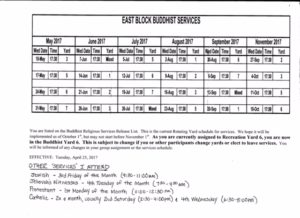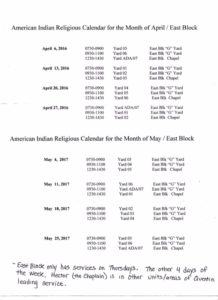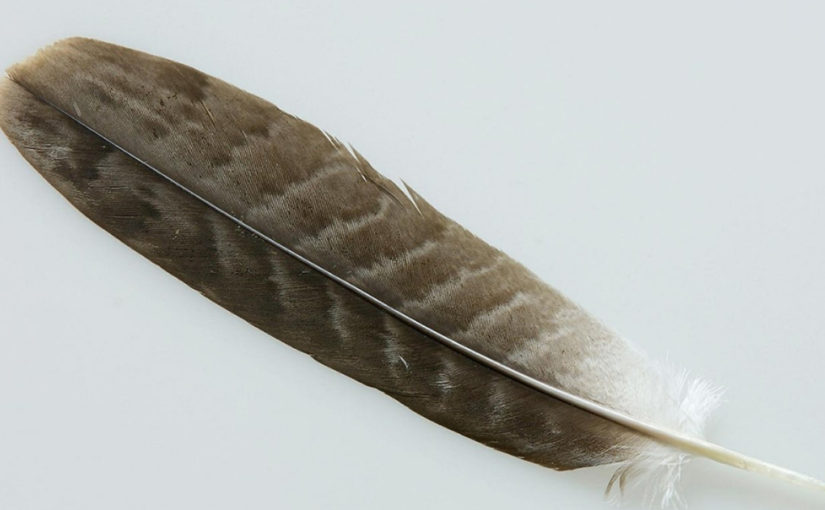We all know the stereotype about prisoners discovering God from behind bars. It’s almost a punch line.
The “non-incarcerated” are often rightly suspicious of a convict who claims to have found religion after being locked up. Is it genuine? Is it just a way to impress the parole board? Maybe he’s only trying to get the kosher meals.
There is also the possibility a person finds God in prison because that is the time when they most need the comfort offered by religion.
Daniel Wozniak and Prison Religion

In Daniel’s very first letter to me, he brought up God and religion. He told me he’d “written several church groups requesting volunteers in attempts to grow the ministry” at the Orange County Jail. I was immediately suspicious this was an attempt to impress me.
It turns out it wasn’t an act, but it wouldn’t have worked anyway. I’m one of those run-of-the-mill agnostic liberal types: hopeful there’s something beyond us “mere humans,” but never quite sure. I do tend to lean toward a belief in reincarnation, but with a “you do you” viewpoint regarding other people’s faith.
Daniel was raised Catholic. His devout mother made sure her family attended church regularly. He’d likely call himself a Catholic still, but he doesn’t limit himself to only one religion. Daniel is a true believer in the existence of God and a life after death. He finds all religions interesting. Luckily for him, San Quentin Prison offers numerous services for the inmates.
The Native American Religious Experience In San Quentin Prison

During yard about a month ago, a man named “Chino,” who can trace his genealogy back to the Aztecs, invited Daniel to attend a Native American religious service. A member has to invite you to the service if you are not of Native American descent. Invitees are called honored guests.
The next time services were held, Daniel was escorted outside to one of the smaller recreation yards. He was initially confused why they weren’t in the “multipurpose chapel” where all the other religious services at San Quentin are held. He’d find out later.
There were seven other inmates in attendance. Six of them were of Native American descent, and the seventh was another honored guest. A Native American chaplain named Hector ran the service. According to Daniel, he “looked like he was in his 40s even though he was in his 70s.”
A History
Hector told them about how San Quentin was the very first prison in the world to incorporate Native American services, and he (Hector) was one of the men who started that program back in the 1970s. Native Americans weren’t even recognized as having an actual religion until Jimmy Carter (who is part Cherokee) became President.
Daniel heard accounts of San Quentin not-always-accommodating treatment of Native American inmates in the past.
Most of the service was a history lesson about Native Americans in prison, and how long and hard they had to fight to have their religion officially acknowledged by the state prison system. Services had been cancelled because of random facility lockdowns. There were occasions when members were harassed by guards, and sometimes Hector wasn’t even allowed to enter the prison under claims he was a security risk.
The passing of the Religious Land Use and Institutionalized Persons Act in 2000 opened the way for all the prisons in California to incorporate Native American services. Daniel was told that San Quentin State Prison even has an authentic sweat lodge with a fireplace that can be traced back to the grandfather of Crazy Horse.
Pipe and Feathers
When they were nearing the end of the service, Daniel discovered why the Native Americans were outside. The eight inmates and their chaplain passed around an actual peace pipe to smoke. This is a pretty big deal considering all California prisons are smoke free.
The final part of the service was a tradition of choosing a feather from the handful Hector fanned out before them. Daniel likened this to “choosing a straw” because the stems were concealed in Hector’s palm.
The feathers all looked alike. They’d been collected on a nearby reservation where hawks and eagles are bred. There is a ceremony conducted after the birds molt their feathers. Feathers are collected, prayed over, and passed out to members of the tribe to be sewed into clothing or a headdress or just kept in the member’s dwelling.
The inmates chose their feathers in order of their ages. Daniel went first and ended up choosing the only eagle feather in the bunch. Later it was explained to him that there is only one eagle feather, which can be differentiated from the hawk feathers because it has a distinct point at the end of its stem (although this couldn’t be seen until after the feather was chosen).
Hector told Daniel that it is an honor and fated for one to choose the eagle feather. Then Daniel was bestowed the title of “Sun Dancer.” It would be his duty to pass on the knowledge he’d learned to generations that follow.
Daniel hung his feather on the door of his cell, and then he passed the knowledge to me, and I’m sharing it with you.
What’s Next?
When Rachel’s trial starts in September, I’ll get back into blogging about the crime. In the meantime, I’ll have occasional posts about Daniel’s prison experience and other topics. Stay tuned!
